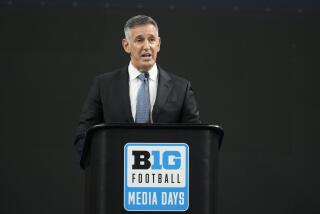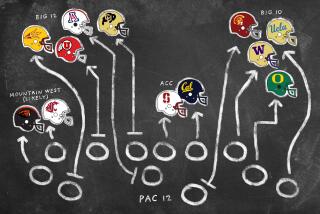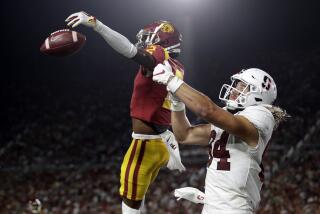Notre Dame Gives Up Its Independence : College: Every sport except football will compete in the Big East starting in 1995.
- Share via
SOUTH BEND, Ind. — It had become “The Question” for John MacLeod. When would Notre Dame’s basketball program join a conference?
It was asked often as the Fighting Irish struggled to losing records the past two seasons, and MacLeod could only shrug as the administration methodically weighed its options.
When Notre Dame finally announced Monday that it had been approved to join the Big East in every sport except football in 1995, MacLeod couldn’t wait for someone to ask his feelings.
“Where are all the guys that want to talk about the conference?” he said, reporters still trickling in for a news conference. “We finally can talk about it. I don’t have to give this canned response anymore.”
The Fighting Irish were introduced as the 13th Big East member only four months after it appeared the chances of joining were scuttled with the addition of Rutgers and West Virginia as full members.
Those former football-only schools were added March 9 and Temple and Virginia Tech, also football-only members, were denied full membership. That ended a basketball vs. football membership feud that had threatened to shatter the 15-year-old conference.
The Big East presidents had said any further expansion before 2000 was unlikely, unless “a unique exception” arose. Notre Dame was that exception.
Big East Commissioner Mike Tranghese said the addition of Notre Dame was “probably the greatest Ben Gay we could apply to our wounds.”
Already entrenched in the New York television market, the nation’s biggest, the Big East now moves into the Chicago market, which is No. 2.
The conference also gets Notre Dame’s immense national following, as well as the addition of lesser-known sports in which the Irish are national powers, including men’s and women’s tennis and soccer, baseball and volleyball.
Notre Dame has been a member of the Midwestern Collegiate Conference, a non-football conference, in every sport but basketball.
For the Irish, the largest impact is the potential for its basketball program to return to the prominence of the 1970s and ‘80s, when it was perennially among the nation’s top teams under Digger Phelps.
The Irish have lost several top recruits in recent years because they were not in a league.
“If we were going to play in the Big East next season, we would have a very difficult time,” said MacLeod.
“But by the time ’95 rolls around we will have had a chance to bring five new players into our program . . . . We’re stepping up big-time.”
Despite MacLeod’s enthusiasm, Notre Dame Athletic Director Dick Rosenthal said the alliance was not made because the basketball team couldn’t compete as an independent.
“I have always maintained that we could continue as an independent. I still do,” said Rosenthal, who was vacationing in Colorado. “I think the emergence of our Olympic sports as national competitors . . . . and the fact that those programs would be enhanced was a clear-cut factor.”
There never was talk about including Notre Dame football.
Notre Dame, Rutgers and West Virginia will begin competing in all sports in the 1995-96 season. A conference format has not been worked out, although it appears likely there will be two divisions with each team playing the others at least once.
More to Read
Go beyond the scoreboard
Get the latest on L.A.'s teams in the daily Sports Report newsletter.
You may occasionally receive promotional content from the Los Angeles Times.










